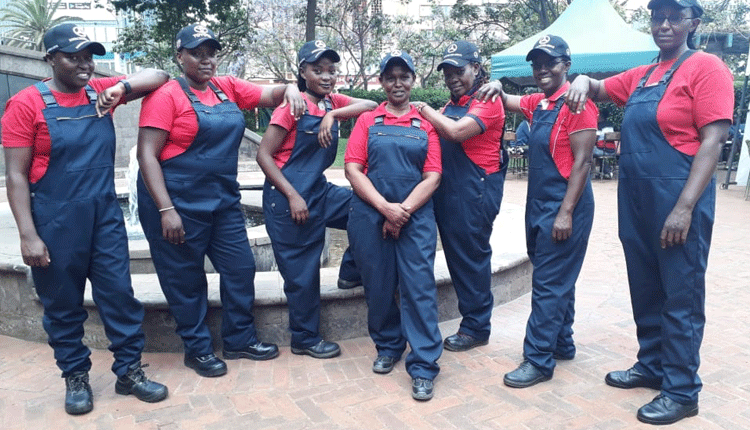Woman mechanic driving change in auto industry

Every day as the sun rises, Rodah Ireri makes her way to Jua Kali in Madaraka Shopping Centre to hustle.
She must make ends meet and this she does by repairing vehicles, a job that she is so passionate about and has done for the last 30 years.
Basically, she is a ‘doctor’ of vehicles or in simpler terms, a motor vehicle mechanic.
She also spearheads the Women in Technical Field Association of Kenya (WITFAOK), an organisation with an office in Komarock, which is made up of 10 women and has partnered with a community-based organisation to train girls on motorcycle mechanics.
She is a go-getter, determined and full of high spirits, each and every day as she purposes to serve her clients to the best of her ability.
Born and brought up in Mbeere sub-county in Embu County, Ireri terms her upbringing as a modest one.
Early interest
“I was brought up in a Christian set-up and my parents attended the Anglican Church of Kenya.
I attended Kiamuringa Primary School and performed well in my Kenya Certificate of Primary Education exams,” says Ireri.
“While in primary school, I never knew I would be interested in being a mechanic, but I used to make small toy cars usually made by boys in the village. I enjoyed the company of boys more than girls,” she adds.
Ireri says it was the noise produced by vehicles and motorbikes that amused her.
“I didn’t understand how that noise came about and little by little, I developed the desire to know what exactly causes or happens for that noise to be produced,” she says.
This was fulfilled when after her primary education, Ireri secured a chance to join Nakuru High school, a school that allowed girls to do technical subjects.
“Previously, the school was for whites only hence it had the facilities to enable one undertake a technical subject.
I did mechanics, woodwork, automotive and electrical technical courses.
In my fourth year, I decided to choose automotive as one of the subjects I would sit for in the exams in addition to other sciences. I found it interesting,” Ireri explains.
She performed well in automotive and was admitted at the DT Dobie Mechatronic College in 1988 and completed her course in 1990.
According to her, the training was tough, very tough and required one to remain focused. It involved cutting metals, disassembling live training models and assembling them again.
Discouragement from men
“Life was not easy because I was the first woman to pursue this course in this college. Some men discouraged me while a few told me to push on.
I remember a day when an old man who is a qualified mechanic called and told me that I had lost my direction in life because of the career I chose and if his son could present me to him as his wife-to-be, he would take me back to my parents,” Ireri recalls.
His words, however, did not break her. “I soldiered on until I completed my three-year-training and was awarded my certificates through the National Industrial Training Authority.
I identified two male trainees from my class who were humble and supported me all through the three-year course,” she adds.
After her training, she was employed by the same company in 1991 where she worked as a mechanic for 17 years and held several other roles in the company.
Later on, more girls joined the college some of whom are now in WITFAOK.
Ireri specialised in diagnosis, unit overhauls, engine gearbox, central locking aircon, body spray paint among other mechanical works.
She met her husband while in her third year of her course and terms him as her greatest support system.
Ireri says: “When we met, he was fully aware of the training I was undertaking.
He is proud of my job, supports me and whenever he introduces me to his friends he says ‘this is my wife, mwanamke bomba and a mechanic by profession’. It makes me feel shy, but at the same time I am happy that he is proud of me.”
Giving it all
When it comes to balancing between her different roles, Ireri says she finds it helpful to prioritise. “I try to ensure that I am dedicated to whichever hat I wear when I wear it.
Hence when I wear the mechanic hat, I give it my all so that when I switch roles and wear another hat like that of motherhood, I can focus on it without feeling guilty,” she explains.
According to her, working in a common ground with her male counterparts is a bit frustrating.
She offers: “Some of them are positive, but others aren’t. I remember another incident where a certain man told me that because I am a woman, I should be at home cooking for my family.
This shows the level of gender inequality women face in some of these technical fields.”
Through her job, Ireri says she has been able to educate and fend for her five children. “I have a roof over my head since we have been able to construct our home upcountry.
I travel and also drive courtesy of my technical job. I believe that a woman can do any job as long as they are determined,” she says.
Ireri plans to empower more girls to join this field and establish a garage and a training centre for the girls.
“A mechanic’s job is a well-paying job, even though many people associate such jobs with dirty people.
I usually share my life experiences with a number of girls and tell them they can make it in the technical field,” she says.










